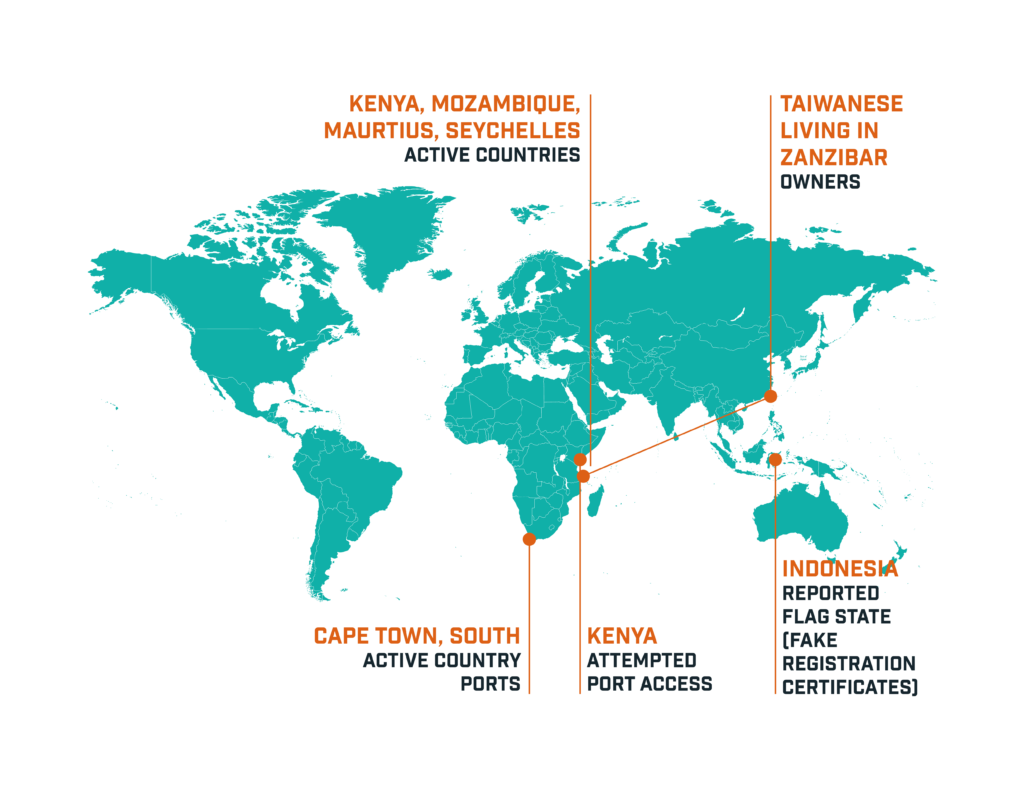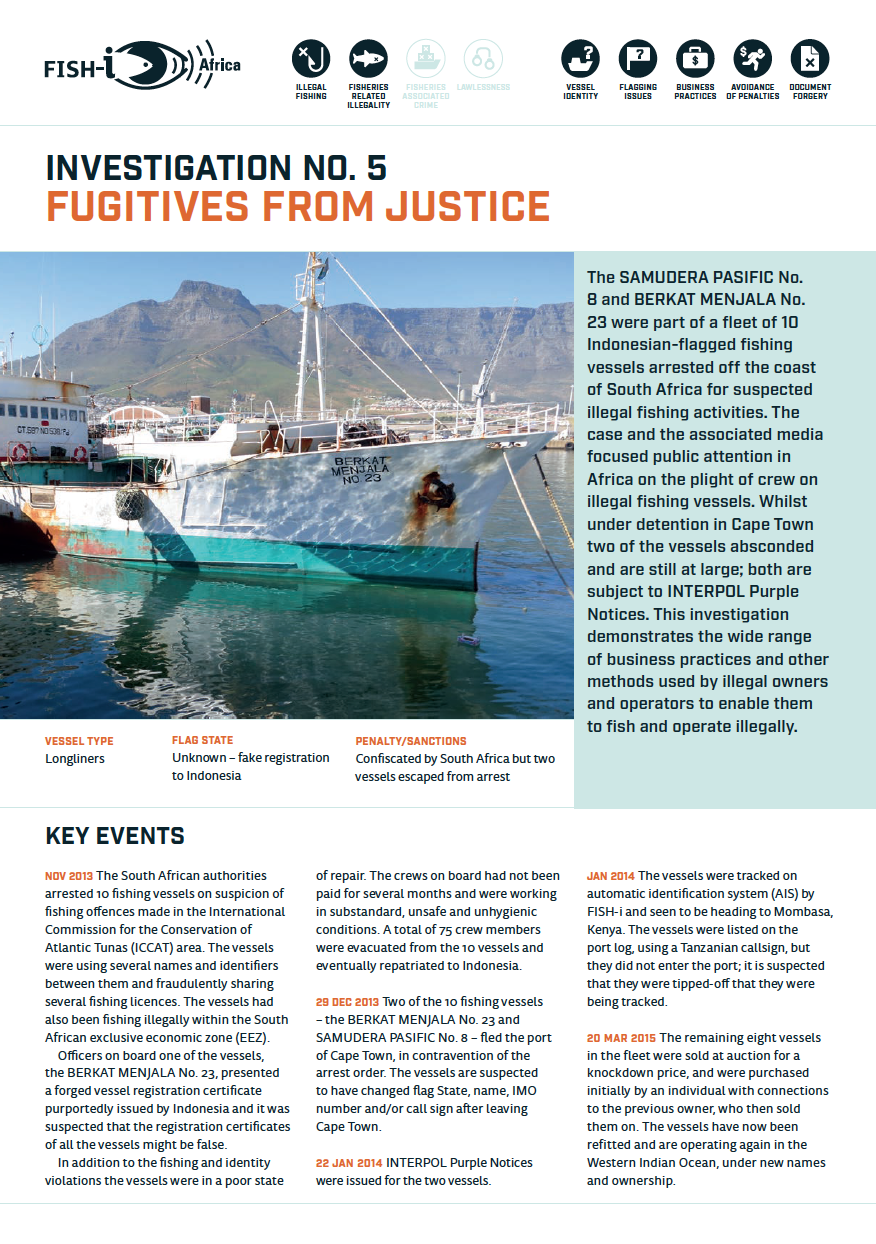INVESTIGATION No. 5 Fugitives from justice
The SAMUDERA PASIFIC No. 8 and BERKAT MENJALA No. 23 were part of a fleet of 10 Indonesian-flagged fishing vessels arrested off the coast of South Africa for suspected illegal fishing activities. The case and the associated media focused public attention in Africa on the plight of crew on illegal fishing vessels. Whilst under detention in Cape Town two of the vessels absconded and are still at large; both are subject to INTERPOL Purple Notices. This investigation demonstrates the wide range of business practices and other methods used by illegal owners and operators to enable them to fish and operate illegally.
Key events
November 2013: The South African authorities arrested 10 fishing vessels on suspicion of fishing offences made in the International Commission for the Conservation of Atlantic Tunas (ICCAT) area. The vessels were using several names and identifiers between them and fraudulently sharing several fishing licences. The vessels had also been fishing illegally within the South African exclusive economic zone (EEZ).
Officers on board one of the vessels, the BERKAT MENJALA No. 23, presented a forged vessel registration certificate purportedly issued by Indonesia and it was suspected that the registration certificates of all the vessels might be false. In addition to the fishing and identity violations the vessels were in a poor state of repair. The crews on board had not been paid for several months and were working in substandard, unsafe and unhygienic conditions. A total of 75 crew members were evacuated from the 10 vessels and eventually repatriated to Indonesia.
29 December 2013: Two of the 10 fishing vessels – the BERKAT MENJALA No. 23 and SAMUDERA PASIFIC No. 8 – fled the port of Cape Town, in contravention of the arrest order. The vessels are suspected to have changed flag State, name, IMO number and/or call sign after leaving Cape Town.
22 January 2014: INTERPOL Purple Notices were issued for the two vessels.
January 2014: The vessels were tracked on automatic identification system (AIS) by FISH-i and seen to be heading to Mombasa, Kenya. The vessels were listed on the port log, using a Tanzanian callsign, but they did not enter the port; it is suspected that they were tipped-off that they were being tracked.
20 March 2015: The remaining eight vessels in the fleet were sold at auction for a knockdown price, and were purchased initially by an individual with connections to the previous owner, who then sold them on. The vessels have now been refitted and are operating again in the Western Indian Ocean, under new names and ownership.
How?
The evidence uncovered during FISH-i investigations demonstrates different methods or approaches that illegal operators use to either commit or cover-up their illegality and to avoid prosecution.
Vessel identity: Crew testimony reports that re-naming vessels by painting new names over old is routine practice and allows vessels to evade detection by authorities. The true identity of the vessels is still unknown.
Flagging issues: The Indonesian registration documents were reported to be fake, so it is likely that the vessels were stateless at the time of their arrest. After absconding, they registered in the Mombasa port log with a Tanzanian call sign.
Business practices: There is evidence that the ownership of the two vessels that escaped was changed while they were under arrest in Cape Town to a company registered in Zanzibar. It was also reported, that the crew had been tricked into working on these vessels, their wages were unpaid and living and working conditions were substandard, unsafe and unhygienic. In addition, it is suspected that the vessels may have been de-commissioned by Indonesia before assuming false identities and engaging in fishing activity in the Indian Ocean and there are also suspicions that corrupt officials may have facilitated the escape of the two vessels from Cape Town, but no charges have been made.
Avoidance of penalties: The detained vessels absconded, and have assumed new identities thereby avoiding penalties for operating illegally.
Document forgery: The vessels were using false Indonesian registration and fraudulently sharing several fishing licences.

What did FISH-i Africa do?
- Worked with the South African authorities and facilitated cooperation between them and Tanzanian authorities.
- Cooperated with INTERPOL.
- Investigated links to organised crime.
- Tracked vessels on AIS and alerted Kenyan port authorities when the vessels were expected to arrive in Mombasa.
What worked?
- Illegalities were detected by the South African fisheries authority during a routine port State inspection.
- Verification of documents with Indonesia identified the registration documents as forgeries.
- Regional cooperation and information exchange between FISH-i members allowed authorities to be on the alert for the escaped vessels entering port.
- INTERPOL issued Purple Notices for the two vessels that absconded from Cape Town.
What needs to change?
- Stronger measures need to be in place to prevent vessels absconding when under detention, this requires close interagency cooperation.
- Although part of the fleet was forfeited and sold there was no further penalty to the owner/operator. Stronger legislation that supports actions against illegal operators is needed.
- Previous owners of illegal fishing vessels should be prevented from re-purchasing them at a later stage.
- Nomination of illegal, unreported and unregulated (IUU) fishing vessels for regional fisheries management organisation IUU listing is required to stop them from continuing to fish.
- Greater support needs to be offered to national authorities that identify human trafficking amongst fishing crew; the costs of repatriation are significant and deter intervention.
- Mandatory unique vessels identification is needed, such as IMO numbers, to make it more difficult for vessels to hide.
- Engagement by the legitimate industry could provide more eyes at sea to locate the absconded vessels.
FISH-i Investigations
In working together on over forty investigations, FISH-i Africa has shed light on the scale and complexity of illegal activities in the fisheries sector and highlighted the challenges that coastal State enforcement officers face to act against the perpetrators. These illegal acts produce increased profit for those behind them, but they undermine the sustainability of the fisheries sector and reduce the nutritional, social and economic benefits derived from the regions’ blue economy.
FISH-i investigations demonstrate a range of complexity in illegalities – ranging from illegal fishing to fisheries related illegality to fisheries associated crime to lawlessness.
In this case evidence of illegal fishing and fisheries related illegalities were found.
